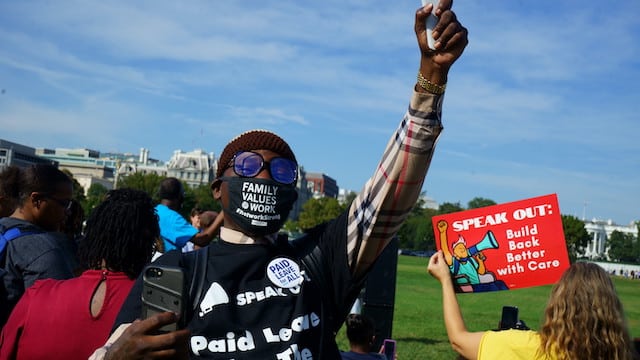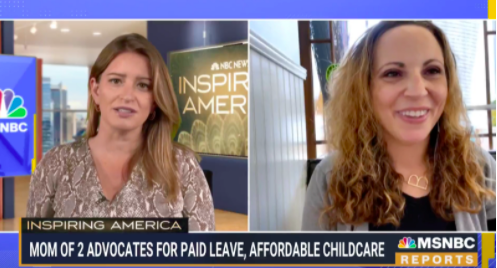Workers Speaking Up for Paid Leave

The pandemic was a giant wake-up call for the nation about the centrality of care. We saw how interdependent we are: Our own health depends on the ability of everyone around us to stay healthy. We saw that, without warning, any one of us could need to give or receive care. Yet for the majority of U.S. employees, doing just that could cost a paycheck or a job.
Responding to this reality, and to growing support and demand for a solution, the Biden-Harris administration is highlighting paid family and medical leave as an essential part of their infrastructure plan. An array of top-level officials are traveling around the country to make the case for that plan, which includes twelve weeks of paid family and medical leave. To demonstrate the urgency of the issue, the movement to win paid leave for all is rolling out our own spokespeople, employees who’ve lived the high physical, financial and emotional cost of policymakers’ inaction.
In just the past week, three leaders from our network have been featured on national news. Bethany Santos Fauteux, Tameka Henry and Kristopher Fabian Garcia are all leaders in their state coalitions and members of the Voices of Workers group (VOW) of the Paid Leave for All campaign. Each illustrated the reasons we can’t afford to wait.
On April 30, Bethany appeared on the Katy Tur show on MSNBC. Katy, just two weeks away from the due date for her own baby, could barely read the lead-in to the story, a statement by Bethany about having to return to work at a child care center just three weeks after giving birth to her son: “As I sat on the floor taking care of other mothers’ children, the pain of my C-section stitches didn’t compare to the pain of not being with my own brand new baby.”

Tur asked Bethany how this experience turned her into an activist. “In those moments, you think it’s the state of affairs and you can’t do anything about it,” Bethany said. But then she met FV@W’s partner organization, Coalition for Social Justice, as they were organizing a campaign to win paid leave in the state of Massachusetts. Said Bethany, “I can’t take back the time that I lost, but I can fight for my fellow Americans not to have to go through that.”
On Sunday, Tameka Henry of Make It Work Nevada joined Lana Zak on CBS News to share what happened to her family when her husband was diagnosed with a permanent disability. Tameka became the sole breadwinner for a family with four kids. Losing pay and sometimes a job when her husband was hospitalized meant starting all over again.
“You have to choose between your life and your livelihood,” is how Tameka put it. Having paid leave would give families critical security, she said. “We want to care for our families, we want to work and live the American dream. But it’s unattainable for people who have a family member with a medical condition we have no control over.”
Tameka talked about her uncle, who over the years had been a caretaker for his father, her grandfather. “Often my uncle didn’t have the time to take care of himself,” Tameka said. “I lost them both during the pandemic.”
Paid leave would allow people “to let [loved ones] know, they’re not in this alone,” she explained. They could provide the care and keep their pay, stay employed — and stay healthy themselves.
Kris Garcia from Colorado 9to5 added another dimension: a parent who had to die alone years before the pandemic. When his dad 900 miles away needed quadruple bypass surgery, Kris’s employer did not allow him to take more than a few unpaid days. “It took me almost eight years to deal with the guilt I felt,” Kris told Ali Vitali on MSNBC. “Paid leave would have made a world of difference.”
All three leaders agreed that paid leave is something we can and must enact. “I know we can afford this,” Tameka said. “Our care infrastructure is just as important as streets and bridges. We need bold, public investments in our care infrastructure so people can keep working. We just need wealthy corporations to pay their fair share.”
We also need our elected representatives to remember they work for us, Bethany added. “It’s time to hold them accountable.”